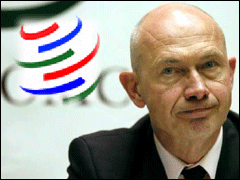DOHA Talks to be Salvage by Global Loan Sharks

GENEVA — Trade ministers will meet at the end of July in a last ditch effort to salvage the deadlocked Doha round of trade liberalization talks.
Spurred by the Group of Eight summit of major industrial countries, ministers from Brazil, the European Union, India, Japan, United States as well as senior negotiators from Australia met with World Trade Organization chief Pascal Lamy to assess the state of play in the negotiations.
They agreed to schedule two further ministerial meetings in Geneva in the final week of the month, when they will try to agree precise formulas for cutting industrial and farm tariffs and subsidies, said U.S. Trade Representative Susan Schwab.
"The idea is to have another go at it with a bit more determination and hopefully a bit more flexibility," said India's Trade Minister Kamal Nath. "The work could spill into August, as there's a lot of work to do."
Ministers will meet in Geneva July 23-24 and again July 28-29, Nath and Schwab said.
The complex trade talks named after Qatar's capital where they were launched in 2001 were aimed at boosting the global economy and lift millions out of poverty worldwide by lowering trade barriers across all sectors, with particular emphasis on developing countries.
But the round, which is already two years behind schedule, has stalled because of differences between rich and poor countries, as well as between the EU and the U.S.
G-8 leaders meeting in Russia on Monday called for greater efforts to move the talks forward, with Brazilian President Luiz Inacio Lula da Silva saying the negotiations were "in a crisis."
"The leaders in St. Petersburg made it clear that we have to make this happen as soon as possible," Schwab said.
Most countries are sticking rigidly to the same positions they have maintained for months, even though Lamy warned that a recent Geneva meeting was the last realistic chance to find agreement on lowering trade barriers.
The entire process is rapidly running out of time because U.S. President George W. Bush's authority to "fast track" the trade deal enabling U.S. envoys to negotiate an agreement that can be submitted to Congress for a yea-or-nay vote without amendments runs out in mid-2007.
"Now the question is to test how flexible are the flexibilities" that leaders expressed in St. Petersburg, added Brazil's Foreign Minister Celso Amorim.
Technorati Tags: WTO, PascalLamy, DOHA, and G8.
